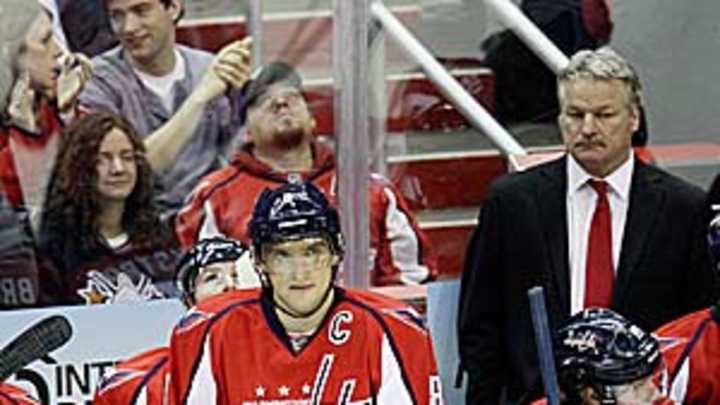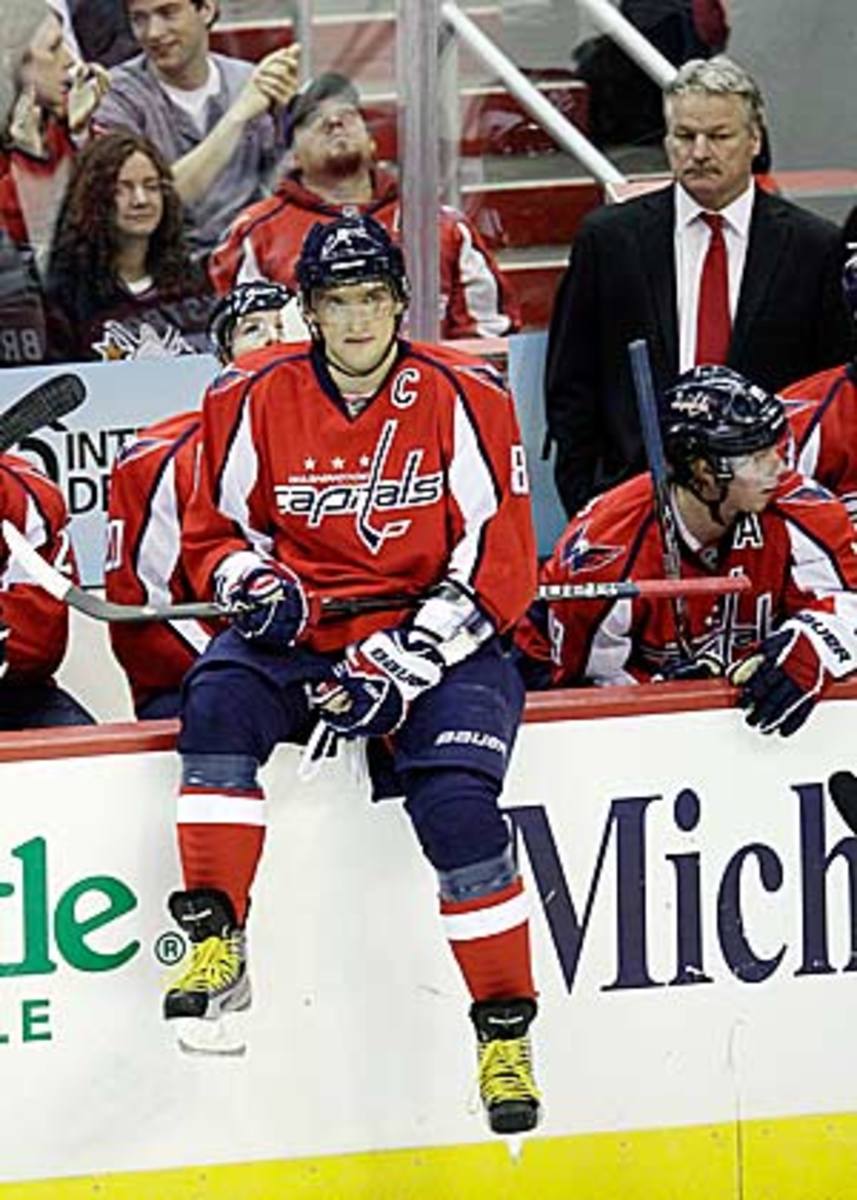Dale Hunter puts family first, Capitals behind him in surprise decision

How much Dale Hunter's relationship with Alexander Ovechkin factored into the coach's decision to quit is an intriguing question. (Rob Carr/Getty Images)

By Stu Hackel
The mercurial NHL coaching career of Dale Hunter came to an end on Monday when he told the Washington Capitals that, after less than six months, it was time to go. He did a lot in a short time, turning the glamorous Caps into a team suddenly known for glamorless defense. He got them into the playoffs, knocked off the defending Stanley Cup champion Bruins in the tightest seven-game series in playoff history and took the Eastern Conference's top seed, the Rangers, to seven games before succumbing, 2-1, on Saturday. But now he'll return to his OHL team, the London Knights, one of hockey's most successful junior franchises, which he co-owns with his brother Mark.
“It wasn't unexpected,” Caps GM George McPhee told reporters at the team's suburban practice facility (video). But for those who saw in Hunter's makeover the direction that the club must take to achieve that elusive playoff success in the Alex Ovechkin Era, the coach's departure can't be anything but a disappointment. Perhaps speaking for that segment of Caps Nation, The Post's sports columnist Tom Boswell called Hunter's decision "UNBELIEVABLE!"
"How can you be Dale Hunter, get everybody to "buy into" your brutally painful way of playing hockey, have some success with it and then QUIT!!!???," an obviously astonished Boswell wrote. "That's not what Dale Hunter does. Is it? That seems out of character. Doesn't he almost have to come back one more year to complete the transition to his methods, then help pick the coach to follow him?"
Well, some will say it is what Dale Hunter does and what Dale Hunter did today. It won't surprise those who detested him during his playing career as one of the most antagonistic players of his time, a cheapshot artist supreme of the highest -- or lowest -- order (here and here, for example). They'll conclude that this is just another.
But let's put ancient grudges and insults aside. In 2012, it's quite possible that Hunter discovered that coaching in the NHL is not as easy as the OHL, that dealing with teenagers who thirst for the big time is light years from dealing with millionaires who have made the big time, some with their own business empires. It may be that he really just wants to return to London, Ontario, to be back on his farm with his family, and that the NHL life -- the long travel, the days away from home, the pressures to win -- doesn't agree with someone who has been his own boss for more than a decade. That would be a plausible explanation -- or perhaps a big part of a more complicated one.
Speaking to the media today (below), Hunter called it "a tough decision to make, but it was the right thing for me and my family....Weighing both sides, going home to the family, the family business, you know, outweighed it."
[vodpod id=Video.16472893&w=425&h=350&fv=]
He got the Capitals to buy into his ideas, and the players -- who were rumored to be mutinous not long after he replaced the likeable Bruce Boudreau in November -- grew to accept Hunter's defense-first approach, especially once they qualified for the postseason and had some success against tough competition. Speaking today, Hunter said he felt the team started to accept his methods on March 8 in a comeback victory over Tampa Bay. Before that, he said he felt they were "trying to be too fancy, trying to outscore teams instead of trying to outplay teams."
How completely they absorbed his lessons, however, was evident on the play that eliminated Washington on Saturday night, when Alex Ovechkin floated back to the bench after being knocked down while his check, Michael Del Zotto, scored the eventual game winner.
Afterward, a subdued Ovechkin took responsibility, saying that if he had played it Hunter's way, he'd have hustled back to the bench and the goal might not have resulted. Blaming Ovechkin for the loss would be wrong. He was not the only Caps player who didn't have his best outing on Saturday. Similarly, blaming him for Hunter's decision would be wrong, too. It's possible some will portray it as a direct consequence of a clash of style with the team's biggest star, whose ice time Hunter cut dramatically in the playoffs. But big decisions in life are rarely that simple.
“It's his decision so we have to live with it,” Ovie said. How happily or unhappily the Capitals captain lives with it, only he knows. He did profess after Game 7 that this was the best Caps teams that he'd played on and he hoped everyone would be back. Ovechkin's former and still-sometimes center Nick Backstrom said, “I really wanted to see (Hunter) back next year but unfortunately he’s not. It’s not good.”
Over the weekend, Tarik El-Bashir in The Washington Post summed up Hunter's tenure, writing, "In six months, he accomplished something his predecessor could not: transform the Capitals into an accountable, resilient, defensively conscious team that, in theory, plays the perfect brand of hockey to succeed in the tight-checking playoffs, even if the low-scoring style is nerve-racking and unfulfilling to some.
"After some initial resistance, the majority of the players bought into Hunter’s philosophy and, in recent weeks, the dressing room and the coach seemed to be pulling in the same direction," El-Bashir continued. "On Thursday, locker room leader Brooks Laich responded, 'Absolutely,' when asked if he wanted Hunter to return. 'He’s been great,' Laich added."
McPhee now has to find his third coach in less than half a year. What seemed like a promising beginning has ended rather quickly.
COMMENTING GUIDELINES: We encourage engaging, diverse and meaningful commentary and hope you will join the discussion. We also encourage, but do not require, that you use your real name. Please keep comments on-topic and relevant to the original post. To foster healthy discussion, we will review all comments BEFORE they are posted. We expect a basic level of civility toward each other and the subjects of this blog. Disagreements are fine, but mutual respect is a must. Comments will not be approved if they contain profanity (including the use of abbreviations and punctuation marks instead of letters); any abusive language or personal attacks including insults, name-calling, threats, harassment, libel and slander; hateful, racist, sexist, religious or ethnically offensive language; or efforts to promote commercial products or solicitations of any kind, including links that drive traffic to your own website. Flagrant or repeat offenders run the risk of being banned from commenting.
